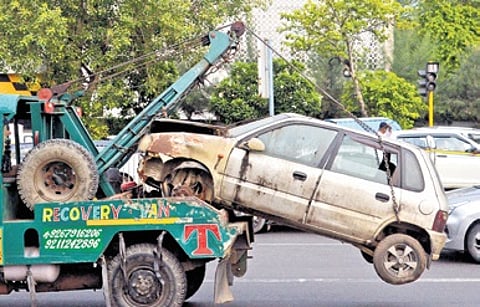

NEW DELHI: The Delhi government has urged the Commission for Air Quality Management (CAQM) to defer the enforcement of a recent directive banning fuel supply to end-of-life (EOL) vehicles, citing serious technological challenges and growing public discontent.
The request came through a letter sent by Environment Minister Manjinder Singh Sirsa, who reiterated the government’s support for air pollution mitigation but called the fuel ban “premature and potentially counterproductive.”
The ban, mandated under CAQM’s Direction No. 89 dated April 23, came into effect on July 1 and prohibits petrol stations from refuelling vehicles that are 10 years or older for diesel and 15 years or older for petrol, as per existing court orders.
Sirsa told the media on Thursday that the ban has sparked anger among residents. “People are unhappy. The government is with them,” he said, placing the blame for “rigid norms” on the previous AAP government.
According to Sirsa’s letter, the enforcement via Automated Number Plate Recognition (ANPR) systems has exposed “crucial operational and infrastructural shortcomings.”
These include malfunctioning sensors and cameras, incomplete integration with databases of neighbouring states, and the system’s inability to detect vehicles with missing or faulty High Security Registration Plates (HSRP).
TNIE had highlighted these operational and implementation issues in a detailed report on May 30, after visiting over a dozen fuel pumps.
The minister also argued that unless the ban is implemented uniformly across the entire National Capital Region (NCR), it risks pushing vehicle owners to procure fuel from neighbouring districts such as Gurugram or Ghaziabad, potentially creating an underground fuel economy.
Sirsa said the Delhi government is already executing a multi-pronged pollution control strategy, from massive tree plantation drives to stricter Pollution Under Control (PUC) norms and trials of cloud seeding.
The government has requested that CAQM suspend the fuel ban until the ANPR system is fully operational and integrated across the NCR. “We are committed to clean air, but it must be done in a practical and just manner,” Sirsa added.
The Opposition AAP, however, claimed that public pressure forced the BJP-led government to roll back the ban, calling it a “victory of the people” and an example of the government’s “double standards” on court’s orders. “Congratulations to Delhi people. The draconian order to seize old vehicles had to be withdrawn,” said AAP chief Saurabh Bharadwaj on X.
Cites public uproar, tech challenges
Tech glitches
Non-functional Automated Number Plate Recognition (ANPR) system at fuel stations, non-working of cameras, sensors and speakers, and failure to detect vehicles due to problems with High Security Registration Plates
Lack of Integration
ANPR system is not yet integrated with vehicle databases of neighbouring states like Haryana and UP, creating a loophole for out-of-state vehicles and hampering effective enforcement
Fuel Smuggling
Implementing the ban only in Delhi could lead vehicle owners to obtain fuel from nearby Gurugram, Faridabad, or Ghaziabad, undermining the policy and encouraging an illegal cross-border fuel market
Phased Rollout
Implementation only in Delhi is ineffective as the government argues for a stage-wise rollout that covers NCR towns to prevent policy evasion
Public Anger
The sudden enforcement triggers huge public uproar, and the government believes that the current system lacks operational maturity